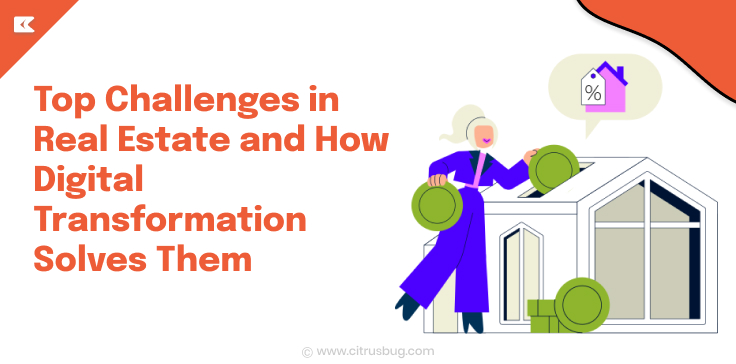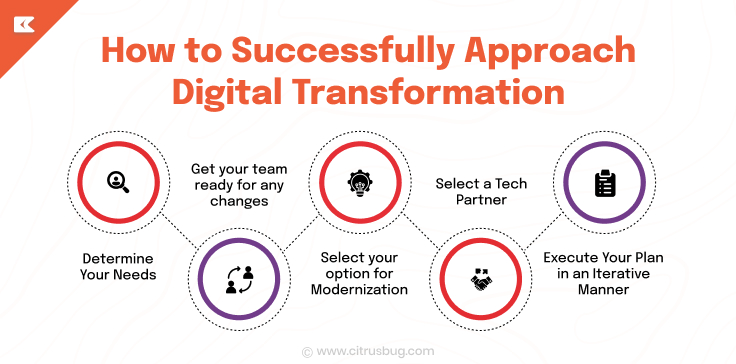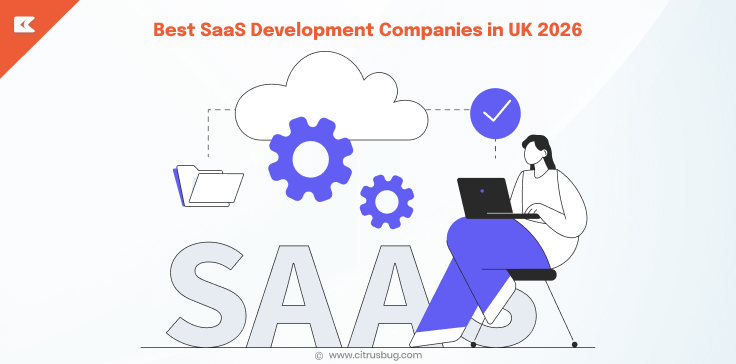Top Challenges in Real Estate and How Digital Transformation Solves Them
- January 29, 2025
-
3305 Views
- by Ishan Vyas
Table of Contents
- The Concept of Digital Transformation in Real Estate
- Why Real Estate Digital Transformation Matters?
- Key Elements of Digital Transformation in Real Estate
- What Opportunities Does Digital Transformation in Real Estate Bring?
- Modern Technologies That Are Transforming Real Estate
- How to Successfully Approach Digital Transformation?
- Conclusion

Modern digital tools and technologies are transforming the real estate market for both brokers and buyers. Real estate companies can increase productivity, customize services, and establish a competitive position going forward by utilizing emerging technologies.
Our purchasing, selling, managing, and investing practices are changing, and companies that adapt to this change will be well-positioned to dominate the market.
The Concept of Digital Transformation in Real Estate
Real estate firms have been aggressively embracing new technologies over the past few years, and this trend is only getting stronger. 41% of customers say they are prepared to buy a home without even viewing it. Therefore, real estate’s digital transformation becomes a top priority. 67% of companies believe that digitalization is essential to their ability to remain competitive, according to Gartner.
Digital transformation in real estate is more than just a trending buzzword these days. Rather, it is fundamentally and significantly changing the real estate sector.
Real estate cutting-edge tools and technologies, also referred to as Proptech Trends, are becoming increasingly popular in the real estate market, from digital transactions and virtual tours to smart contracts.
Why Real Estate Digital Transformation Matters?
Adopting digital transformation is essential for a real estate professional or business to survive in the fiercely competitive digital real estate market, where consumer and market demands are ever-changing. Nowadays, providing the greatest customer experiences and fostering relationships are more important in the real estate industry than merely selling properties to customers.
Consumers today prefer virtual tours of properties from the comfort of their own homes rather than making several trips to view them. The importance of these real estate tools and technologies for contemporary real estate clients is demonstrated by their shifting and changing needs.
Real Estate Digital Transformation for Businesses
The number of businesses offering real estate services that use digital technologies is continuously increasing. Digital transformations have the following benefits for real estate companies:
- Increasing online outreach
- Streamlining processes
- Driving more clients
By utilizing smart contracts, quality digital marketing tools, and switching between CRM systems, they reduce their costs.
Real Estate Digital Transformation for Customers
Clients can benefit from digital transformations in real estate in the following ways:
- A chance to find what they need quickly
- Comprehensive details about properties
- A simplified procedure for concluding a contract
Since a lot of buyers use mobile apps to find properties, it is essential for real estate firms to have a strong online presence. You can differentiate yourself from the competition by making sure that every customer is completely satisfied with the online home-buying process.
Key Elements of Digital Transformation in Real Estate
Better Customer Experience
These days, a client would rather use a mobile app, take a 3D tour, and get in touch with a broker online quickly in order to find a real estate property. By concentrating on producing top-notch 3D tours, a real estate company enhances the client experience.
Personalized Customer Experience
Businesses can now satisfy customer demands thanks to digitization. When creating a real estate app, it is crucial to include a variety of search filters because each home buyer has different needs. Don’t forget to give clients comprehensive details about real estate properties.
Personalized Well-Informed Decisions
Data-based solutions that support business analytics are the most crucial components of digital transformation in real estate industry. Making data-driven decisions based on a variety of criteria is made possible by having access to big data. Clients and businesses are aware of local environmental issues, crime rates, noise levels, infrastructure, and urban development projects.
Personalized Digital Procedures
The real estate examples of digital transformation show how new technologies also alter the industry’s business procedures. Big data, mobile apps, smart contracts, VR tours, and cloud-based solutions enable businesses to boost productivity and profitability. Big data, mobile apps, smart contracts, VR tours, and cloud-based solutions enable businesses to boost productivity and profitability as well as create personalized customer success process for each potential customer.
What Opportunities Does Digital Transformation in Real Estate Bring?
Real estate digital transformation offers the chance to see improvements in a number of areas, including customer relations, operational effectiveness, and building sustainability. Emerging technologies allow you to:
Improve the Experience for Customers
The digital expectations of real estate buyers are rising. They want more information about the buildings they live in, individualized real estate services, and the ability to search, purchase, and rent properties in a convenient, transparent, and time-efficient manner. By enhancing customer engagement and retention, digital tools can assist your business in meeting these demands.
Scale Business Revenue
Technologies have the potential to greatly speed up current business procedures and contribute to the scalable creation of new value for customers. Put another way, technology allows you to reach and serve a larger clientele without hiring additional real estate agents. As a result, you can raise income without also raising expenses.
Boost Company Operations
In addition to helping businesses overcome talent shortages, routine task automation, streamlined operations and collaboration, and advanced data analytics can boost real estate professionals’ productivity and data-driven decision-making.
Control the Risks Associated with Sustainability.
You can gain more insights into building sustainability and ESG regulation compliance by using smart devices and analytics tools to track the performance of your real estate assets. This will increase your company’s appeal to investors and customers.
Improve Security and Transparency.
The traceability, accuracy, and public availability of transactions and records are made possible by modern technologies, which also allow for their more secure and decentralized storage. By utilizing these capabilities, you can enhance the cybersecurity and accountability of your business. Managers can leverage transaction monitoring for property managers to safeguard assets and ensure compliance, demonstrating a practical application of these digital tools.
Modern Technologies That Are Transforming Real Estate
Cloud Computing
Personalized Cloud-based solutions began to replace on-premises solutions years ago. 40% of US real estate firms have already embraced cloud services, according to Statista. These days, cloud computing is still a crucial component of the real estate industry’s digital transformation: according to 37% of business executives, cloud computing will be one of the most significant technologies for their company over the next five years.
Internet of Things (IoT)
Personalized IoT has several applications in real estate. Smart devices are effective tools for managing the sustainability of buildings, assisting businesses in gathering and tracking information on the temperature, energy consumption, air quality, and other physical attributes of buildings and their surroundings.
In order to detect smoke, suspicious activity, and other safety and security concerns, IoT devices are also utilized in security systems. All things considered, this technology helps to improve living conditions and manage real estate more effectively.
Since over 70% of businesses use IoT and say it can help lower building maintenance costs by up to 30%, many real estate players have already realized the advantages of IoT devices.
AI in Real Estate
Personalized Artificial intelligence is often linked to the current digital transformation of the real estate industry, particularly with generative AI models that are pre-trained on vast amounts of data, can support both generative and non-generative tasks, and are less expensive and time-consuming to deploy than traditional AI.
AI chatbots are used by real estate companies to enhance customer service, streamline searches, gather client information, and focus their marketing efforts. If you’re searching for top-notch AI development services, think about getting in touch with Integrio.
Blockchain
One of the best examples of digital innovation in real estate is blockchain technology. Businesses automate and secure transactions by putting blockchain solutions into place. Everyone can access real estate data thanks to blockchain technology.
How to Successfully Approach Digital Transformation?
The way you approach digital transformation in real estate will determine its success. Although it’s not as simple as clicking “update,” altering how your company runs can have a big positive impact on its productivity and profitability.
What is the best way to go about digital transformation? We outline the key actions you should take to change your business while lowering risks.
Determine Your Needs
You must examine your current business procedures and determine which ones are still manual and can be optimized with digital solutions, or where your current software isn’t adding enough value. One of the best ways to identify areas for improvement is to ask staff members about the major workflow issues they face.
At this point, it’s also critical to take customer needs into account. What shortcomings have clients observed in your offerings? What do you lack to satisfy their demands?
Following analysis, you will have a clear understanding of what needs to be improved in order to run more smoothly, cut expenses, and improve your services.
Get Your Team Ready for Any Changes
Every business, and particularly the real estate industry, revolves around its people. Modernizing your company won’t be successful if you don’t tell your employees why it’s necessary, what changes to anticipate, and how they can get ready for them.
Successful digitalization of real estate can be substantially aided by a clearly stated understanding of current issues and how technology can address them. Additionally, you must encourage your staff to welcome change, learn new digital skills, and be open to ideas about how to complete tasks more quickly.
Select Your Option for Modernization.
-
Improve existing systems
Start by evaluating your software and its architecture in order to enhance current systems. Depending on the outcomes, you can redesign the architecture, incorporate third-party solutions, add features, or move to the cloud, as AvalonBay did to reduce hosting costs by 50%. Effective modernization in line with business objectives is ensured by consulting with a group of professionals that includes a software engineer, QA specialist, business analyst, and UI/UX designer. Although functionality may be limited, third-party solutions offer limited customization, so speak with your vendor to meet your needs.
-
Try off-the-shelf solutions
If your current software is causing errors or reducing productivity, consider switching to a more functional and efficient solution. The proptech industry offers many SaaS options you can explore, with flexible subscription models allowing easy cancellation. However, ready-made solutions often lack the customization needed for unique business requirements. To stand out and address specific needs, many real estate companies opt for custom software or a mix of custom and third-party tools.
-
Create custom software
Custom software provides a fully tailored solution to meet your business needs and streamline processes. It allows you to consolidate multiple tools into a single platform, customize functionality, and ensure performance, scalability, and security. While custom development requires more investment upfront, it boosts productivity, efficiency, and customer satisfaction. Real estate companies increasingly embrace this approach, with 72% investing in tailored tools alongside off-the-shelf solutions, as highlighted in a JLL report.
Select a Tech Partner
You will need a team with technical expertise on your side whether you want to develop new custom software or enhance your current systems. You have two choices for gaining access to this knowledge:
-
Assemble an internal team
Establishing an internal development team is a fantastic choice if you would rather have complete control over the modernization of your company. However, make sure you have the time to participate in each stage of development and know what skills to hire. Additionally, remember that you will need to budget for hiring and onboarding, benefits packages, salaries, and the required hardware and software in addition to the costs of app development
-
Outsource software development
Outsourcing custom software development allows companies without in-house teams to get tailored solutions with minimal effort. By partnering with an experienced software development company, you can focus on your business goals while they handle recruitment, onboarding, and development. You stay involved in key decisions and progress updates but avoid micromanagement. For best results, choose a tech partner with expertise in real estate software development to ensure they address industry-specific needs and mitigate development risks effectively.
Execute Your Plan in an Iterative Manner
The iterative approach is the safest way to embrace real estate digitalization. By implementing changes gradually, you can modernize quickly, assess the impact of new tools, and make necessary adjustments. This minimizes risks, reduces costs by addressing flaws early, and eases team adoption of new workflows.
A key example is the lean startup methodology, where you start with a minimum viable product (MVP) containing essential features. By testing, gathering feedback, and refining the MVP, you ensure it meets your needs before adding new features, following a continuous improve-and-scale cycle.
Conclusion
Companies can reshape their operations, increase productivity, make better decisions, and provide value that surpasses end users’ expectations by embracing digital transformation in the real estate industry. Emerging technologies are viewed by industry participants as a means of successfully tackling current business obstacles.
Working with a company that offers real estate software development services is a great way to acquire technical expertise if you don’t have one in-house. A tech partner can help you plan and carry out the entire implementation process, think through potential risks and develop a plan to mitigate them, and advise you on the best architectural design and functionality to meet your business needs.





 SaaS Development
SaaS Development Web Application Development
Web Application Development Mobile Application Development
Mobile Application Development Custom Software Development
Custom Software Development Cloud Development
Cloud Development DevOps Development
DevOps Development MVP Development
MVP Development Digital Product Development
Digital Product Development Hire Chatbot Developers
Hire Chatbot Developers Hire Python Developers
Hire Python Developers Hire Django Developers
Hire Django Developers Hire ReactJS Developers
Hire ReactJS Developers Hire AngularJS Developers
Hire AngularJS Developers Hire VueJS Developers
Hire VueJS Developers Hire Full Stack Developers
Hire Full Stack Developers Hire Back End Developers
Hire Back End Developers Hire Front End Developers
Hire Front End Developers AI Healthcare Software Development & Consulting
AI Healthcare Software Development & Consulting Healthcare App Development
Healthcare App Development EHR Software Development
EHR Software Development Healthcare AI Chatbot Development
Healthcare AI Chatbot Development Telemedicine App Development Company
Telemedicine App Development Company Medical Billing Software Development
Medical Billing Software Development Fitness App Development
Fitness App Development RPM Software Development
RPM Software Development Medicine Delivery App Development
Medicine Delivery App Development Medical Device Software Development
Medical Device Software Development Patient Engagement Software Solutions
Patient Engagement Software Solutions Mental Health App Development
Mental Health App Development Healthcare IT Consulting
Healthcare IT Consulting Healthcare CRM Software Development
Healthcare CRM Software Development Healthcare IT Managed Services
Healthcare IT Managed Services Healthcare Software Testing services
Healthcare Software Testing services Medical Practice Management Software
Medical Practice Management Software Outsourcing Healthcare IT Services
Outsourcing Healthcare IT Services IoT Solutions for Healthcare
IoT Solutions for Healthcare Medical Image Analysis Software Development Services
Medical Image Analysis Software Development Services Lending Software Development Services
Lending Software Development Services Payment Gateway Software Development
Payment Gateway Software Development Accounting Software Development
Accounting Software Development AI-Driven Banking App Development
AI-Driven Banking App Development Insurance Software Development
Insurance Software Development Finance Software Development
Finance Software Development Loan Management Software Development
Loan Management Software Development Decentralized Finance Development Services
Decentralized Finance Development Services eWallet App Development
eWallet App Development Payment App Development
Payment App Development Money Transfer App Development
Money Transfer App Development Mortgage Software Development
Mortgage Software Development Insurance Fraud Detection Software Development
Insurance Fraud Detection Software Development Wealth Management Software Development
Wealth Management Software Development Cryptocurrency Exchange Platform Development
Cryptocurrency Exchange Platform Development Neobank App Development
Neobank App Development Stock Trading App Development
Stock Trading App Development AML software Development
AML software Development Web3 Wallet Development
Web3 Wallet Development Robo-Advisor App Development
Robo-Advisor App Development Supply Chain Management Software Development
Supply Chain Management Software Development Fleet Management Software Development
Fleet Management Software Development Warehouse Management Software Development
Warehouse Management Software Development LMS Development
LMS Development Education App Development
Education App Development Inventory Management Software Development
Inventory Management Software Development Property Management Software Development
Property Management Software Development Real Estate CRM Software Development
Real Estate CRM Software Development Real Estate Document Management Software
Real Estate Document Management Software Construction App Development
Construction App Development Construction ERP Software Development
Construction ERP Software Development








